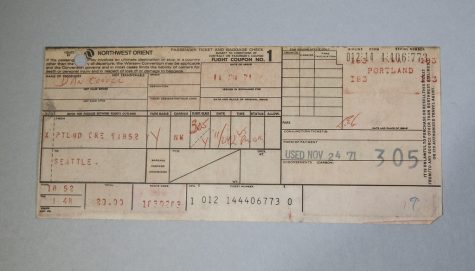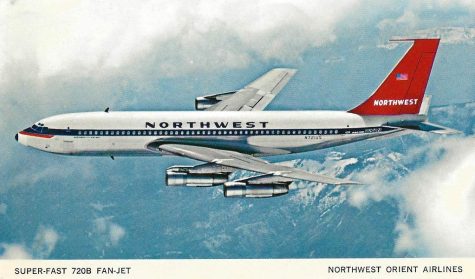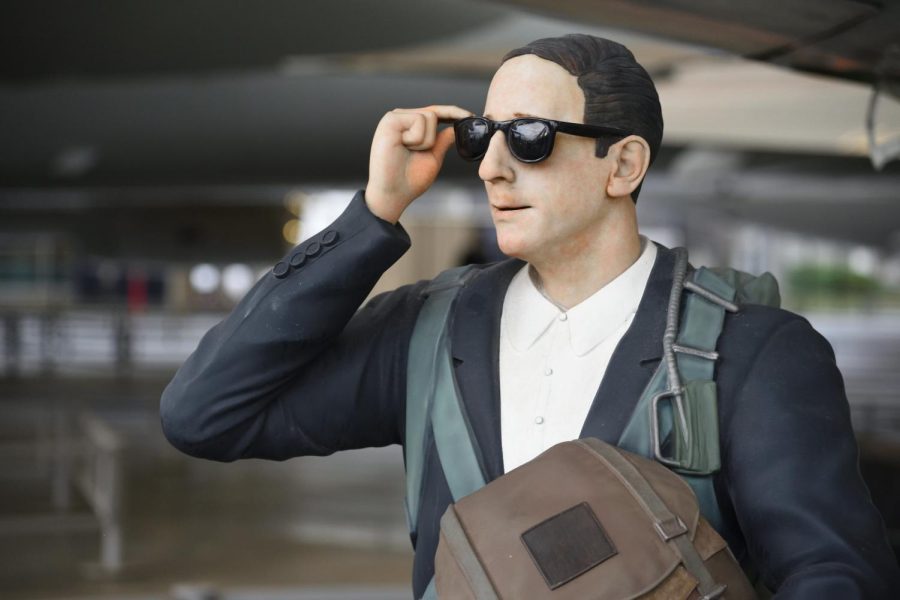Caught in 4k But Not in Cuffs: D.B. Cooper and Pop Culture
The 50th anniversary of the United States’ only unsolved skyjacking
IAN ABBOTT VIA FLICKR
D.B. Cooper has never been identified, and no one knows what happened to him after the plane landed.
December 13, 2021
On Nov. 24, 1971, a man operating under the name Dan Cooper, who the press later referred to as “D.B. Cooper,” hijacked Northwest Orient Airlines Flight #305, a Boeing 727 headed for Seattle. His true identity and fate remain a mystery, and both are still subject to conspiracy theories and amateur investigations. Cooper’s skyjacking captured the interest of numerous creatives who have memorialized the unprecedented heist.
While in flight, Cooper gave a stewardess a note explaining that he had a bomb in his briefcase and requesting that she sit with him. After he showed her the bomb, he gave her a note to take to the captain that demanded $200,000 in $20 bills.
The lives of passengers were exchanged for the money and parachutes. He then had the captain set course for Mexico City and, somewhere between Seattle and Reno, Cooper parachuted from the plane with the money in suboptimal conditions. It is unlikely that he was trained and the heavily wooded area he jumped over would have been difficult for anyone to navigate.
There were no crew injuries, and the plane landed safely in Seattle, but 50 years later, the skyjacking is still unsolved.
The lack of answers regarding Cooper’s whereabouts has made him a compelling mystery to theorize over and include in fictional or speculative works.
In the years since Cooper’s daring escape and unknown fate, the story of the hijacking has inspired conspiracy theories, books, TV shows, movies and treasure hunts. It is referenced or used as a plot device in a multitude of crime shows and movies and as a gag in other genres. As the man was speculated to be in his 40s at the time of the heist, and it’s been 50 years since he pulled it off, it’s likely he took the secret to the grave. But the question of when he may have died remains a point of contention.
In 2016, the FBI closed its investigation of the Cooper hijacking, and the files were released under the Freedom of Information Act. The FBI dubbed the case NORJAK (Northwest Hijacking), and its casefile is 393 pages with no conclusive answers.
Seven years after the incident, a child found $5,800 with serial numbers matching that of Cooper’s $200,000 ransom demand payout in the woods near the Columbia River outside of Vancouver, Washington. The only other material evidence was Cooper’s tie and part of his parachute. The FBI has compared suspects’ prints with those pulled from the plane to no avail. One of the main suspects, Sheridan Peterson, passed away on Jan. 8, 2021 — which further cemented doubt that the case will ever close. The lack of answers regarding Cooper’s whereabouts has made him a compelling mystery to theorize over and include in fictional or speculative works. It opens up possibilities like magical escapes and romantic rendezvous with one of the flight attendants. While it is likely that Cooper, whoever he may have been, is dead, pop culture has romanticized a surviving, successful criminal.

It is probable that Cooper died before ever getting the chance to enjoy the spoils of his successful airplane hijacking, but no one can prove it.
Many crimes committed in the 1960s and 1970s have served as the inspiration for movies, TV shows, books, podcasts and more, but it is rare to see a singular event like Cooper’s heist featured so heavily in pop culture. The versatility of Cooper’s story comes from the lack of conclusive answers, but it is not the only airplane-adjacent crime to fall short of being fully solved.
On Dec. 11, 1978, $5.8 million was stolen from the German airline Lufthansa at John F. Kennedy International Airport, and only led to one member of the suspected group of criminals being arrested. This crime inspired movies like “Goodfellas” (1990), “The 10 Million Dollar Getaway” (1991) and “The Big Heist” (2001). Despite the narrative appeal it initially garnered, it seems to have lost relevance in the 25 years after and is not as well known.
There are also dramatized versions of Frank Abagnale Jr.’s life and crimes. Abagnale Jr., a conman native to New York City, has been played by Leonardo DiCaprio in the 2002 movie “Catch Me If You Can,” as well as inspired the character Neal Caffrey, played by Matt Bomer, on the TV show “White Collar.”
There is a convention in Vancouver, Washington called CooperCon.
True crime’s popularity as a genre is increasing steadily, and binge-watching TV shows and movies is undoubtedly on the table for a lot of students over the winter holiday break, but no hijacking has garnered so much attention for this long.
Having inadvertently established himself in pop culture history, fictionalized Coopers have popped up throughout a multitude of works. A few examples of his appearances include him showing up as a character in season 5 episode 6 of “Leverage,” in season 1 episode 1 of “Loki,” the 2020 movie “The Mystery of D.B. Cooper” and an episode of “Buzzfeed Unsolved.”
One of the recurring characters in the 12-yearlong TV series “Prison Break” was D.B. Cooper, though he used a different name. These, plus several other shows, movies and more than two dozen books demonstrate Cooper fulfilling a niche within pop culture. There is a convention in Vancouver, Washington called CooperCon; this year’s was a special 50th-anniversary symposium held on Nov. 20 and 21.
The skyjacking gives off the air of an action movie plot, so it’s no wonder that it has made its way onto the silver screen. People are fascinated and enthralled by true mysteries and heists, so being “inspired by the true story” and unsolved 50 years after the fact opens the case up for discourse.
The r/dbcooper thread on Reddit eagerly suggests resources for familiarizing yourself with the case as well as independent theories and discussion. Memes, questions, amateur investigations and more are all readily available. However, this thread is far from the only one throwing his name around. The fact that Cooper, his briefcase and the rest of the money has not been found has conspiracy theorists going wild, with popularity levels reminiscent of theories concerning JFK and the magic bullet.
Pop culture is free to throw hypotheticals at the story, hoping something might stick without fear of offending or upsetting anyone. With half a century between us and Cooper’s crime and no compelling suspects or leads, it is likely that this case will go down in the history of unsolved crimes — alongside long-standing and far more violent cases like that of the Zodiac Killer and Jack the Ripper — and Cooper will continue to be a character in pop culture.

Cooper isn’t the only criminal who has captured the public’s eye and imagination. True crime’s popularity as a genre is increasing steadily, and binge-watching TV shows and movies is undoubtedly on the table for a lot of students over the winter holiday break.
In addition to Cooper’s continued relevance in pop culture, adaptations of other true crime stories are readily available in the form of heist movies like the 2002 “Catch Me If You Can,” which is a dramatized version of Frank Abagnale Jr.’s life and crimes.
Abagnale, a conman native to New York City has, like Cooper, inspired pop culture representation. Leonardo DiCaprio’s depiction of him in the 2002 movie, Abagnale’s allegedly true memoir sharing its title, and the character Neal Caffrey on the 2009-2014 show “White Collar” were inspired by his exploits.
Abagnale Jr.’s sensationalized crimes, which include posing as an airline pilot and check forgery, also inspired the book “The Greatest Hoax on Earth: Catching Truth, While We Can” by Alan C. Logan. The book was released in December 2020 and investigates the discrepancies between the mythos Abagnale has created around his criminal escapades and the memories of the people he affected. On April 13, 2021, NPR’s program “Watching America” featured Logan and his findings on Abagnale.
Cooper’s skyjacking of Northwest Orient Airlines Flight #305 and subsequent escape has captured people’s imaginations through its 50th anniversary.
Many crimes committed in the 1960s and 1970s have served as the inspiration for movies, TV shows, books, podcasts and more, but it is rare to see a singular event like Cooper’s heist featured so heavily in pop culture. The versatility of Cooper’s story comes from the lack of conclusive answers, but it is not the only airplane-adjacent crime to fall short of being fully solved.
On Dec. 11, 1978, $5.8 million was stolen from the German airline Lufthansa at John F. Kennedy International Airport, but only led to one member of the suspected group of criminals being arrested. This crime inspired movies like “Goodfellas” (1990), “The 10 Million Dollar Getaway” (1991) and “The Big Heist” (2001). Despite the narrative appeal it initially garnered, it seems to have lost relevance in the 25 years after and is not as well known.
Cooper’s skyjacking of Northwest Orient Airlines Flight #305 and subsequent escape has captured people’s imaginations through its 50th anniversary. The new releases of movies and books so long after the fact, as well as the still-active Reddit thread, demonstrate that the unsolved skyjacking has cemented itself in pop culture in an unprecedented way.













